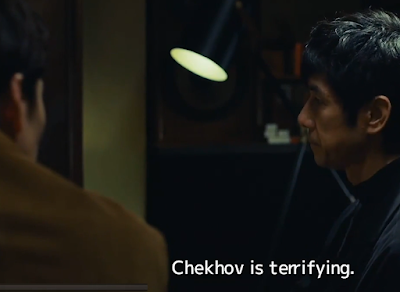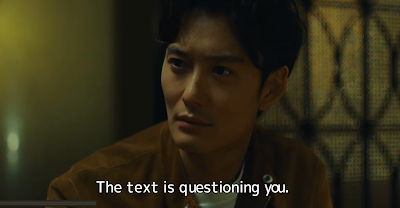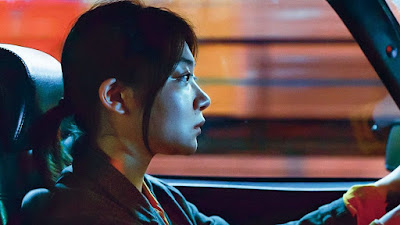There's more of Haruki Murakami in this highly literary movie — adapted from one of his short stories in the Men Without Women anthology — just as there is a good deal more of Anton Chekhov than the brief mentions of Uncle Vanya in the same.
In this absorbing meeting of minimalisms (take your pick as to whether the hidden depths are Japanese or Russian), Ryûsuke Hamaguchi has created a fascinating synthetic narrative out of the bare structure of that tale and things which are hinted at within it.
It is as subtle as it is long. We viewed it like a mini-series: roughly three hour long episodes. The first did just about enough to make us want to pick it up the next evening (rather like that first instalment of Ted Lasso).
At times I felt I was being sucked into a live action version of one of those coffee table books on Japanese style. The author's westernised cultural tastes and predilection for vinyl records are also referenced.
The yellow convertible Saab 900 Turbo of the source story has become a fixed top version and a crimson European artefact slicing through a landscape of premeditated blandness.
I was engrossed, and yet I have to admit that the thought kept occurring to me that the last thing I would want to sit through would be an experimental production of Uncle Vanya performed in four different languages including Korean sign-language. (And that maybe it would help if I had either seen or read that play a little more recently.)
Murakami's story is slightly unsatisfying because the basic set-up, a confessional on wheels between an actor and his professional driver feels artificial in the short form.
Kafuku is an actor with a newly-detected glaucoma and thus needs someone to drive him around in his vintage Swedish small car whilst he rehearses his lines. He has some vaguely sexist opinions about female drivers, and on meeting Misaki Watari sums her up as "brusque, close-mouthed, not at all cute". He is nevertheless "intrigued" and is presently won over by her smooth gear changes, thereafter detailing his most bothersome existential anxieties to her.
In the movie Kafuku shifts to the front passenger seat as both characters find that they have profounder, more perplexing and unresolved pasts to share, an emotional journey that leads to a cathartic road trip.
The switch from Tokyo to a theatrical festival in Hiroshima in the central section also adds flesh to the bones.
Murakami had Kafuku confide how his wife became serially unfaithful after the loss of a child. And how, after her death from cancer, he made friends with her final lover — a good-looking non-entity of an actor — as a kind of studied dramatic performance which he thought might enable him to belatedly discover her motivations.
Hamaguchi preserves the basic 'plot', yet his Kafuku is a more soulful, less transparent character and he has made much more of the scandal and disaster-prone younger lover, Takatsuki. And he conflates the intimacies, between actor and driver, between the two actors and between their textual and symbolic alter-egos.
Far more than simply a female sounding-board, Watari has an inner life as intriguing as her passenger's, her smoothness emanating from a decidedly choppy childhood and a need to contain her sense of guilt for how she presumed to drive away from it.
Some of the rehearsals for this play I thought I'd never want to see*, along with one excerpt from the finished production, are amongst the most compelling scenes in cinema I have come across in the past twelve months.
Drive My Car is a truly sumptuous collection of parts, undoubtedly more than the sum of them, yet never quite an orderly whole.
For sometimes life itself can feel like that, less a coherent journey along a single trajectory than a confusingly disordered panorama of paths taken and not taken, never fully consigned to the rear-view mirror, the human self relentlessly variegated over time by personas adopted and abandoned, assimilation a metaphysical hypothetical, more adapted to the hereafter.
And there's no turning back or even a chance to pull into a rest stop.
Murakami does give his Kafuku one central observation that is not taken up in the film, at least not explicitly. That for every actor concluding a role "the self that one returned to was never exactly the same as the self that one had left behind." Hamaguchi's Watari does however keep her almost concluding sermon: that sometimes "genuine" complexity need not be either contradictory or confounding.
* The Korean sign-language part turned out to be the best!





No comments:
Post a Comment